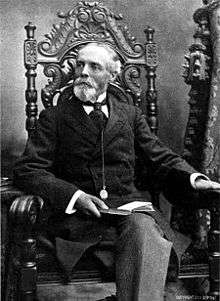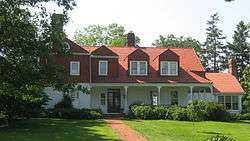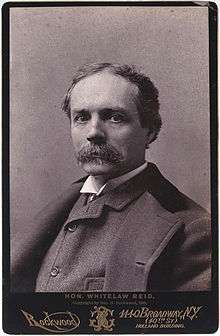Whitelaw Reid
| Whitelaw Reid | |
|---|---|
 | |
| United States Ambassador to the United Kingdom | |
|
In office June 5, 1905 – December 15, 1912 | |
| Monarch |
Edward VII George V |
| President |
Theodore Roosevelt William Howard Taft |
| Prime Minister |
Arthur Balfour Sir Henry C-Bannerman H. H. Asquith |
| Preceded by | Joseph H. Choate |
| Succeeded by | Walter Hines Page |
| 28th United States Ambassador to France | |
|
In office March 23, 1889 – March 25, 1892 | |
| President | Benjamin Harrison |
| Preceded by | Robert M. McLane |
| Succeeded by | T. Jefferson Coolidge |
| Personal details | |
| Born |
October 27, 1837 Cedarville, Ohio, USA |
| Died |
December 15, 1912 (aged 75) London, England |
| Political party | Republican |
| Profession | Politician, Editor |
| Signature |
|
Whitelaw Reid (October 27, 1837 – December 15, 1912) was an American politician and newspaper editor, as well as the author of a popular history of Ohio in the Civil War. After assisting Horace Greeley as editor of the powerful Republican newspaper, the New York Tribune, Reid purchased the paper after Greeley's death in 1872 and controlled it until his own death. The circulation grew to about 60,000 a day, but the weekly edition became less important. He invested heavily in new technology, such as the Hoe rotary printing press and the linotype machine, but bitterly fought against the unionized workers for control of his shop. As a famous voice of the Republican Party, he was honored with appointments as ambassador to France (1889) and Great Britain (1905), as well as numerous other honorific positions. In 1898 President William McKinley appointed him to the American commission that negotiated peace with Spain after the Spanish–American War.[1]
Early life

Born on a farm near Xenia, Ohio, Reid attended Xenia Academy and went on to graduate from Miami University with honors in 1856.[2] At Miami, he was a member of Delta Kappa Epsilon (Kappa chapter), and lobbied for the expulsion of the six members who ultimately founded Sigma Chi.
He was the grandfather of prominent journalist and New York Herald Tribune editor Whitelaw Reid.
Career

He was the longtime editor of the New York Tribune and a close friend of Horace Greeley. He was a leader of the Liberal Republican movement in 1872.
During the war he wrote under the by-line "Agate".
A Republican, he had an illustrious career as a diplomat, serving as United States Ambassador to France from 1889 to 1892, and as U.S. Ambassador to the Court of St. James's from 1905 to 1912.
In 1892, Reid became the Republican vice presidential nominee when President Benjamin Harrison chose to drop Vice President Levi P. Morton from the ticket. Harrison and Reid lost to the Democratic ticket of Grover Cleveland and Adlai Stevenson, as Cleveland became the first former president to recapture the office.
Reid was given a spot on the peace commission following the Spanish–American War. Manhattanville College in Purchase, New York, is located on his former Westchester County estate.
Reid Continue to the role of the Tribune As one of the foremost Republican newspapers in the country. He emphasized the importance of partisan newspapers in a speech in 1879:
- The true statesman and the really influential editor are those who are able to control and guide parties....There is an old question as to whether a newspaper controls public opinion or public opinion controls the newspaper. This at least is true: that editor best succeeds who best interprets the prevailing and the better tendencies of public opinion, and, who, whatever his personal views concerning it, does not get himself too far out of relations to it. He will understand that a party is not an end, but a means; will use it if it lead to his end, -- will use some other if that serve better, but will never commit the folly of attempting to reach the end without the means....Of all the puerile follies that have masqueraded before High Heaven in the guise of Reform, the most childish has been the idea that the editor could vindicate his independence only by sitting on the fence and throwing stones with impartial vigor alike at friend and foe.[3]
He received the degree LL.D. honoris causa from the University of Cambridge in June 1902, when he was in the United Kingdom as Special Ambassador to attend the Coronation of King Edward VII.[4]
He was a member of Stanford University's board of trustees from 1902 until 1912.[5]
Death
He died while serving as the ambassador to Britain on December 15, 1912. His remains are buried in Sleepy Hollow Cemetery in Sleepy Hollow, New York.
Publications
- After The War: A Southern Tour (May 1, 1865 to May 1, 1866.) London: Samson Low, Son, & Marston, 1866. Full text.
- Ohio in the War: Her Statesmen Generals and Soldiers. Cincinnati: Robert Clarke Co., 1895. Vol. 1 & Vol. 2.
- The Greatest Fact in Modern History. New York: Crowell, 1907. Full text.
- American and English studies. New York: Scribner, 1913. Vol. 1 (Government and Education) & Vol. 2 (Biography, History, and Journalism)
References
- ↑ Michael P. Riccards. "Reid, Whitelaw"; American National Biography Online Feb. 2000
- ↑ American Authors 1600-1900: A Biographical Dictionary of American Literature (H. W. Wilson Co., New York, 1938)
- ↑ Whitelaw Reid, American and English Studies, Vol. II (1913), pp. 258-60
- ↑ "University intelligence". The Times (36787). London. 6 June 1902. p. 11.
- ↑ Elliott, Orrin Leslie (1937). Stanford University: The First Twenty-five Years. Stanford University Press. p. 466.
Further reading
- Baehr, Harry William. The New York Tribune Since the Civil War (Octagon Press, Limited, 1972)
- Cortissoz, Royal. The Life of Whitelaw Reid (2 Vol. Scribner's Sons, 1921). online
- Duncan, Bingham. Whitelaw Reid: journalist, politician, diplomat (University of Georgia Press, 1975), A standard scholarly biography
External links
| Wikimedia Commons has media related to Whitelaw Reid. |
| Wikisource has original works written by or about: Whitelaw Reid |
- Works by Whitelaw Reid at Project Gutenberg
- Works by or about Whitelaw Reid at Internet Archive
- Modern Eloquence: Vol III, After-Dinner Speeches P-Z at Project Gutenberg, contains two speeches by Reid.
- Abraham Lincoln by Whitelaw Reid
- Byron. Address at University College, Nottingham, on Speech day, 29th Nov., 1910, for the Byron chair of English literature by Whitelaw Reid
- One Welshman: a glance at a great career. Inaugural address, autumn session, University College of Wales, Aberystwyth, October 31st, 1912 by Whitelaw Reid
- Our new duties: a commencement address at the seventy-fifth anniversary of Miami university, Thursday, June 15, 1899 by Whitelaw Reid
- Whitelaw Reid at Find a Grave
| Diplomatic posts | ||
|---|---|---|
| Preceded by Robert M. McLane |
United States Ambassador to France 1889 – 1892 |
Succeeded by T. Jefferson Coolidge |
| Preceded by Joseph H. Choate |
United States Ambassador to the United Kingdom 1905–1912 |
Succeeded by Walter Hines Page |
| Party political offices | ||
| Preceded by Levi P. Morton |
Republican nominee for Vice President of the United States 1892 |
Succeeded by Garret Hobart |